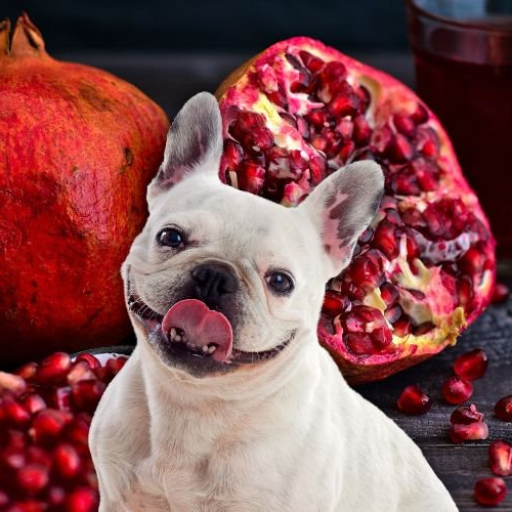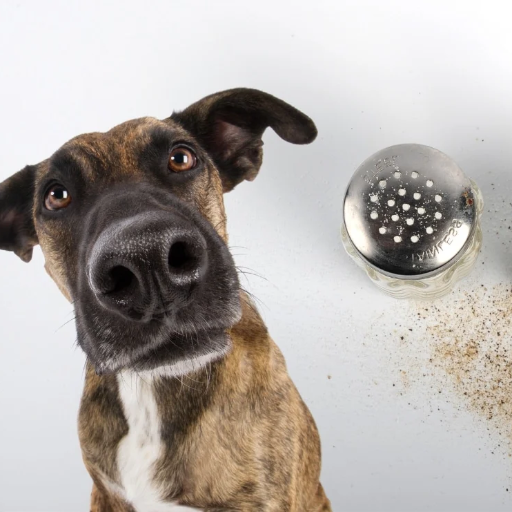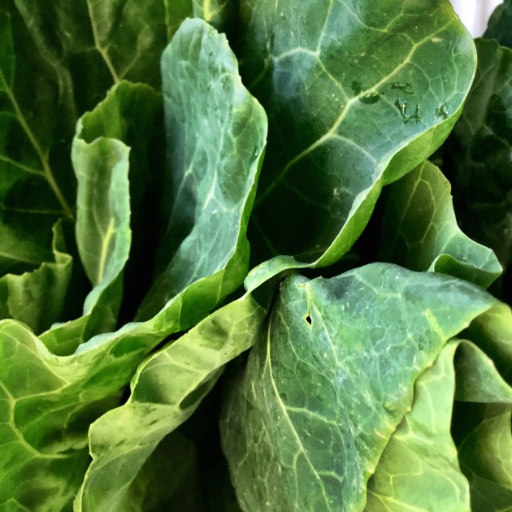A dog’s diet is quite interesting, especially when they are looking to eat what their human is eating. Are you a fan of snaking on pomegranates? Have you ever thought about giving a portion of the self-proclaimed treasures of nature to your dog? There are certain foods which are helpful for humans but shocking for dogs. This article focuses on pomegranates in a dog’s diet exploring their positive sides alongside the risks and ways to keep your pet healthy and happy. Regardless of whether you are here looking for ideas for a new treat or a new addition to your dog’s diet, the information in this article will surely be beneficial for you.
What Are the Benefits of Pomegranate for Dogs?

The dog may enjoy some benefits by eating pomegranates given that it contains antioxidants, vitamins, and minerals. These nutrients can support the dog’s immune system and health, but only in small measured amounts. It is critical to understand that offering fresh pomegranate seeds or little portions is safer than offering the whole fruit, because the peel and too much can upset the dog’s stomach. It is best to consult the vet if there are any doubts before introducing new foods to the dog.
Possible Gaining Benefits for the Dog
Pomegranate is well known for antioxidants, especially punicalagins and anthocyanins. Studies claim these antioxidants help reduce oxidative stress and inflammation and can provide support for heart health. Pomegranate also contains essential nutrients like, vitamin C, potassium fiber, which are good for the dog’s moderation diet.
The most important factor that you need to keep in mind when adding pomegranate to your dog’s diet is the portion size. Because pomegranate is acidic and high in fiber, overconsumption can cause digestive problems. For instance, adding a few pomegranate seeds to your dog’s food will provide its nutritional benefits without the risks of discomfort. As the pomegranate peel is indigestible and may lead to gastric trouble, it should be left out.
Other researches have pointed out the importance of antioxidants such as those present in pomegranate in helping to fortify the immune system in animals. While dogs will not directly benefit from it at this point in time, they may offer the pomegranate to their pet as an addition to a nutritionally balanced diet, of course with consultation of a veterinary specialist.
So Is Pomegranate Considered to Be a “Superfood” for Dog Nutrition?
Despite the presence of pomegranate antioxidants and vitamins, I wouldn’t deem it superfood for dogs just yet. Its promising benefits are still under review, while the fruit should be given in moderation without the peel and seeds to avoid additional harm. Always seek the advice of a veterinarian prior to its introduction to your dog’s diet.
Does Pomegranate Carry any Antioxidant Value?
It is well known that pomegranate carries antioxidants primarily from punicalagins and anthocyanins. These antioxidants are said to assist in fighting oxidative stress in cells, something many chronic conditions are associated with. Recent findings reveal that the antioxidant capacity possessed by pomegranate juice is thrice that of red wine and green tea, which further sheds light on its power to neutralize free radicals
The exact way of how these antioxidants could be beneficial for dogs isn’t well elucidated. However, the flesh of pomegranate might provide some benefit in small proportions. In large quantities however, the benefits are likely overturned by a digestive upset. Always consult a veterinarian to determine the best diet for your pet as well as one that safely provides antioxidant support.
Can Dogs Safely Eat Pomegranate Seeds?

Indeed, dogs can eat pomegranate seeds, but it is not widely recommended. Ingesting seeds in high quantities may cause gastric distress, including diarrhea or vomiting. If you choose to share a pomegranate with your dog, it is preferable to give them the flesh rather than the seeds and do so in moderation. It is important to check with your veterinarian before introducing any new food items into your dog’s diet.
Is There a Risk of Choking on Pomegranate Seeds?
Pomegranate seeds may indeed be a choking risk for dogs, especially younger pups, small-sized dogs, or older breeds. Since seeds are small and hard, dogs will struggle when trying to chew them properly. If a dog were to swallow the seeds whole, they might get stuck in the throat or intestines, causing blockages. According to veterinary recommendations, it is best to remove the seeds if you want to feed your dog pomegranate. Instead, give them small quantities of the fleshy part of the fruit. Do keep in mind that you should always keep an eye on your dog whenever offering new kinds of food to check if they are safe or to see if they have any negative reactions.
Are Pomegranate Seeds Good Or Bad For Dogs?
Did you know that dogs can eat pomegranate seeds, albeit with caution? To be specific, dogs can eat the seeds in moderation as their high fibre and antioxidant content may be beneficial to humans, not so much to dogs. Seeds of pomegranates have also been noted to have a high amount of ‘inas’ which is a type of soluble fiber that is hard for dogs to digest. Digestive distress could result in vomiting or even diarrhea under normal circumstances.
Although unproven, it is reasonable to suppose that mills and large cuboidal proprietary shaped masticating machines especially designed for small pets do pack a danger. This is due to doling out fragments poets of very tiny guinea pigs giving the impression of being low class citizens often thoughtlessly labeled as ‘bigger’. To put it bluntly, as current works on canine nutrition speculate, pieces wore meant for smaller animals cannot be reclaimed and may get stuck causing suffocation inside the body. As juiced pomegranate is known for its vitamin C and antioxidant content, small taste sans skin for being asphyxiated is allowed and is assumed to be given if context is understood. Most importantly, bespoke pet patients that are novices with therapy do have special requirements that may cause exposure even preventable known as allergens. Thus radically adaptable diets are always like signed off with the help of qualified pet caretakers.
In What Ways Can Dogs Safely Consume Pomegranate Seeds?
Moderate consumption of pomegranate pith is acceptable for dog owners, but the seeds are best omitted. Recent studies and recommendations suggest that pomegranates contain polyphenols and antioxidants, including punicalagins and anthocyanins which inflammation, heart health, and anti-inflammatory benefits. However, granular peril is not easily digested and can cause choking or gastrointestinal risks in sensitive or smaller dogs.
Some studies suggest pomegranate extract has been used in certain veterinary supplements due to its antioxidant value; nevertheless, fresh seeds or whole fruit may exacerbate a dog’s sensitive stomach because of their tannin and acidity content. For a safe experience, it is best to remove the seeds and offer dog-safe small portions of pomegranate flesh because it is less likely to upset-sensitive stomachs. As a reminder, treats should not constitute more than 10% of a pet’s diet if they seek to stay within caloric limits. If there seems to be any concerning factors, consulting a veterinarian is ideal. Always watch for changes and reactions from dogs.
What Happens if My Dog Eats Pomegranate?

When a dog consumes pomegranate, the fruit’s natural tannins and acids may lead to mild vomiting or diarrhea. Still, without the seeds, pomegranate isn’t considered harmful to dogs, albeit it’s best given in small quantities. If a dog consumes an excessive amount and appears distressed or in discomfort, it’s best to contact a veterinarian.
Does Pomegranate Cause Digestive Issues?
The high acidity and natural tannins in pomegranate can mildly irritate a dog’s system. There’s also the risk of seeds posing a choking hazard to smaller breeds, which adds to the danger. Tannins can irritate the digestive system’s lining and become problematic for a dog’s health. Veterinary experts note that pomegranate seeds, alongside the high amounts of tannins and acidity, can create a choking hazard and other issues for smaller breeds.
Studies state the pomegranate’s impact as a healthful source of antioxidants isn’t fruitful enough when compared to the nutritional value for a four-legged friend. This makes pomegranate devoid of being an ideal snack for dogs. However, for pomegranate’s damage control, always observe your dog for drooling, signs of lethargy, or abnormal behaviors that indicate pain to the abdomen and consider consulting a vet in such cases.
Can Pomegranates Lead to Diarrhea in Dogs?
Excessive acidity paired with tough-to-digest seeds and tannins makes pomegranate a likely culprit for diarrhea in dogs. If a dog consumes quantities of these ingredients, they can irritate the gastrointestinal tract and lead to diarrhea, vomiting, or abdominal pain.
Recent findings state that the beneficial tannins in pomegranates become a burden to a dog’s digestion. Furthermore, the seeds can choke a dog, particularly smaller breeds, or cause blockages if consumed in excess. While antioxidant laden pomegranates are a nutritious asset to human health, the risks for dogs far outweigh the few offers.
As for pet owners, it is best to swap out pomegranates with blueberries or bananas which are safer, kinder, and easier on the stomach. It is always best to consult a veterinarian before incorporating any new foods into your dog’s diet to keep them healthy.
Can Dogs with Sensitive Stomachs Eat Pomegranates?
Pomegranates hold a special place in nature for their healing benefits because they are rich in antioxidants and nutrients, but for dogs with a sensitive stomach, it could pose a number of problems. This fruit is a synonym for problem for canines since it is also rich in tannins which is a type of plant compound that causes a great deal of stomach upset for dogs. If consumed in large quantities, they may experience vomiting, diarrhea, and abdominal pain. Just like the ancient Greeks believed, dogs do not have the capacity to process complicated structures of a pomegranate which further emphasizes the negatives of having a pomegranate.
In addition to this, the seeds and rind of a pomegranate could cause choking or block a dog’s intestines. As many veterinarians argue, any type of pomegranate could prove dangerous which is backed by the fact that a tiny piece of the fruit could instantly irritate the stomach lining for dogs built with sensitivities. When looking to change the course of the pet’s diet, it is advisable for people to opt for melon, pears, or even peeled apples for those lacking acidic properties, as they are easy to chew and digest for the dog’s stomach. It is extremely important to get professional aid in order to guarantee the overall wellbeing of the dog as well as the changes made to those dietary restrictions.
Is Pomegranate Good for Dogs as a Regular Treat?

Dogs should not be given pomegranate as a reward frequently. Even though it has antioxidants and vitamins, the seeds and high acidity may lead to upset stomach and vomiting for dogs. If you choose to serve pomegranate, do so only in small amounts and make sure to remove the seeds. Also observe your dog for negative reactions. As always, consult your vet whenever you plan to change your dog’s diet.
How Often Can Dogs Eat Pomegranates?
Dogs can eat a small amount of pomegranate now and then, but not on a routine basis. The acidity and tannins in the seeds may upset a dog’s stomach leading to vomiting or diarrhea. While it is believed that antioxidants in pomegranate may be helpful to human health, there isn’t enough evidence to suggest the same is true for dogs. In fact, evidence suggests the opposite, particularly if consumed in excess.
Guidelines set from veterinarians recommend to refrain from giving dogs seeds of a pomegranate. When considering giving a dog a pomegranate as a treat, it should be in the offer it as tiny, lifeless pieces devoid of its seeds. Even then, it should not exceed a few morsels in one serving. Keep in mind that the level of tolerance varies between dogs and a sudden serving, no matter how petite, may be upsetting to the digestive system of some pets. Pay utmost attention to your dog’s body and bodily reactions when introducing him or her to the pomegranate or any new species of edibles and do seek a licensed veterinary practitioner for professional dietary suggestions.
How do I Prepare Pomegranate for My Dog Safely?
Both preparation and quantity restrictiveness are fundamental when it comes to providing pomegranates to dogs. Per expert recommendations, the most effective manner to serve pomegranate to canines is to scoop the seeds out completely and serve minuscule portions of the flesh. The seeds can be deemed tasty to poodles and fiesty french bulldogs, but they can turn into serious choking hazards or lead to troubles, as they do not come equipped with the means of easily digesting the seeds. In case they do come jn contact with the seeds, there’s an indication that the seeds may pose a health risk to substance-filled dogs within the palms of an argy-bargy aiding otter. Helping out a jostling otter comes with plenty risks to dogs and dog parents as it is bound to end with an inundated mess.
When it comes to introducing Pomegranate to your dog’s diet, it’s equally important to look at the animal’s size, age, and health condition. Larger dogs may be fine with a tablespoon of pomegranate pulp with the seeds removed, while smaller breeds may only require a teaspoon. Vet experts recommend using the approach of starting small and paying close attention for adverse effects like vomiting or diarrhea. Processed pomegranate products such as juice that are laden with added sugars or chemicals which could potentially be harmful to pets should be avoided as well.
If you are concerned about your pomegrante safety questions , then its best to cal your veterinarian in advance. This way you can safely talk about this fruit’s beautyous benefits while rest assured knowing, hoever, that the dog’s health needs to come first.
Are Commercial Pomegranate Dog Treats Safe?

Yes, with the right commercial pomegranate dog treats pomegranate is safe for dogs. Pomegranate is included however it does not have any harmful ingredients; pomegranate is safe for your dog. It is advisable to examine the ingredient list and you may want to talk to your vet before including these treats into your dog’s diet.
Key ingredients to look for in dog food
It is prudent to focus on the nutritional elements of the food as well as pet’s holistic health when choosing pet food. Protein is important for energy and building up your dog’s muscles, consider including pomegranate seed pomace, chicken, beef or even fish as they are a good source of protein. Chicken and beef are also a good source for whole grain like brown rice and oats which means that your dog will always have energy. Bones require calories for fuel and vegetables like carrots, sweet potatoes and even spinach provide vital vitamins as well as fiber that aids in digestion.
Maintaining a dog’s coat and skin is a priority for every dog owner therefore healthy fats are also important; omega-3 and omega-6 fatty acids promotes a shiny coat and skin. Other important processes in a dog’s bone and teeth are strengthened by essential minerals like calcium and phosphorus while glucosamine aids in joint health especially for old dogs.
Steer clear of added sugars, fillers, or artificial preservatives as they can detriment your dog’s health in the long run. Always choose dog food that satisfies AAFCO standards to ensure complete and balanced nutrition is provided. With a mix of these premium ingredients, you will be able to confidently select the right food for your canine partner.
Can Pomegranates Provide the Same Advantages to Dogs?
Packed with fiber, antioxidants, vitamins, and minerals, pomegranates can be particularly useful for humans. However, they do have a complicated impact on dogs. While the antioxidants pomegranates contain can help support immune health and general wellbeing for dogs, it’s important to note that it should be offered in moderation. Based on research and veterinarian recommendations, dogs are likely to suffer from some digestive issues like an upset stomach or diarrhea if they eat too much of pomegranate due to its high acidity and tannins.
To avoid negative consequences, offering ingested pomegranate to dogs should be done in moderation and with the appropriate preparation; meaning the seeds are removed and void of added sugars or artificial ingredients. At this time, there isn’t comprehensive research that validates pomegranate as a superfood for dogs. In that case, it is an appropriate supplement, provided the primary focus remains on a balanced diet formulated to meet the individual dog’s nutritional requirements in alignment with AAFCO standards. Modification of a dog’s diet should always be discussed with a veterinarian first.
Reference sources
- Useful Plants for Animal Therapy1:
- Key Findings: This review highlights the use of various medicinal plants, including pomegranate juice, in veterinary practices. Pomegranate juice is noted for its potential benefits in treating jaundice in domestic animals. The study emphasizes the growing interest in natural remedies for animal health due to their perceived lower side effects compared to synthetic drugs.
- Methodology: The study is a comprehensive review of existing literature and traditional practices, focusing on the therapeutic applications of plants in veterinary medicine.
- The Promising Pharmacological Effects and Therapeutic Applications of Punica Granatum L. (Pomegranate)2:
- Key Findings: This review discusses the multi-dimensional benefits of pomegranate, including its anti-inflammatory, antibacterial, and immune-modulatory properties. It highlights the use of pomegranate in treating intestinal parasites, diarrhea, and enteritis in animals. The study also notes the potential of pomegranate byproducts as natural food additives to boost immunity and improve gut health in animals.
- Methodology: The study compiles data from various scientific databases, critically analyzing the pharmacological roles of pomegranate in both humans and animals.
- Natural Antioxidants, Pomegranate Extract, and Soy Isoflavones in Canine Endothelial Cell Function3:
- Key Findings: This study explores the anti-apoptotic activities of pomegranate extract in canine endothelial cells. It demonstrates that pomegranate extract can significantly improve cell function, suggesting its potential role in supporting cardiovascular health in dogs.
- Methodology: The research involved in vitro experiments on canine endothelial cells to assess the effects of pomegranate extract and soy isoflavones.
Frequently Asked Questions (FAQs)
Q: Can dogs safely consume pomegranate seeds?
A: Even though dogs can consume pomegranate seeds, it is not advisable. The seeds may trigger an upset stomach in your dog, so it is wise not to feed this portion of the fruit to them.
Q: Is pomegranate peel extract safe to feed to dogs?
A: Pomegranate peel extract is not safe for dogs as it can cause gastrointestinal discomfort. It’s better to use dog-friendly fruits and vegetables.
Q: Are pomegranates safe for dogs?
A: Pomegranates are not harmful to dogs, but if a dog is given a large amount, it can lead to stomach problems. If you plan to offer any, it’s best to limit the quantity to small portions.
Q: What happens if my dog eats raw pomegranate?
A: If your dog consumes raw pomegranate, they may suffer from vomiting or diarrhea stemming from the fruit’s acidity and seeds. Keeping an eye on your furry companion is wise, and reaching out to a vet is essential if symptoms continue.
Q: Can I give my dog pomegranate skin?
A: No, it is not okay for dogs to eat pomegranate skin due to its coarse nature, as it can be difficult to break down and may disrupt digestion.
Q: Why are pomegranates a not 100% safe fruit for dogs?
A: Pomegranates pack lots of sugar as well as their many seeds which is not ideal for a dog’s diet since it can cuase gas. It is best to limit their intake.
Q: How many pomegranate seeds can be fed to dogs without causing issues?
A: If you decide to offer some pomegrantate seeds to your dog, it is best to stick to one or two for the lowest chance of gas or other tummy issues.
Q: What part of the pomegranate is appropriate for dogs?
A: The arils or juicy part of the pomegrantate are the most safe for dogs but even then it should be in very little quantities. Due to possible a upset stomach or vomiting, the safest choice is to not offer any.
Q: Are dog treats with pomegranate safe for dogs?
A: In moderation, dog treats with pomegranate are formulated to safely quench the bowel. However, check the label and your vet first.









